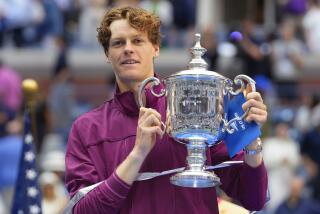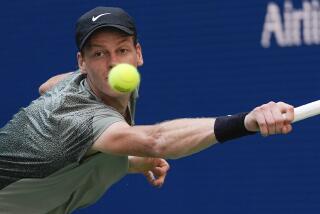Safin Uses His Charm to Mitigate Any Harm
Who needs handlers and spinners if you are Marat Safin?
“Write nice things about me,” he says, smiling.
It’s not an order. Well ... maybe not.
This is a guy who won’t allow his personality to be airbrushed by operatives. The 25-year-old Russian has always done his own retouching, and quite successfully, at that. Few are better at softening an outrageous quote or action with a wink and a smile.
He tosses a racket or breaks one, and there’s soap-box talk that he’s hurting the game. The best example came when Safin dropped his shorts at the French Open last year, receiving almost as much attention for that in some quarters as he did for winning the 2000 U.S. Open.
There was no fine for the moon moment over Paris. Randy Moss pretends to drop and gets hit with a $10,000 fine from the NFL.
“There’s no such thing as bad press. It’s a press and they write about you, it’s already a good thing,” Safin said in an interview during the Pacific Life Open in the players’ lounge at Indian Wells Tennis Garden.
The tilt has been pro-Safin, and then some, in 2005. He shook off the heavy specter of the one-Slam-wonder tag, finally winning No. 2 in spectacular fashion in Melbourne at the Australian Open in January.
In the semifinals, he beat defending champion Roger Federer of Switzerland in a five-set epic, fighting off a match point, and ended Federer’s 26-match winning streak. Instead of faltering at the finish line because of exhaustion -- the way he did in the 2004 Australian Open final -- Safin got across it, fighting off Lleyton Hewitt of Australia and an expectant nation with the help of Federer’s former coach, Peter Lundgren.
Safin has been thinking about the Federer match, probably because he is often asked about it. Federer had been carrying an aura of invincibility, having won three of the four Grand Slam tournaments in 2004 and not lost to a player ranked in the top 10 since the fall of 2003.
“You want this match to be a classic like [Boris] Becker-[Stefan] Edberg. Safin-Federer,” Safin said. “Different generations. Win or lose, you are really having fun and enjoying it. No matter how hard it is, you remember the feeling on the court. And I’m still remembering.
“These kind of matches, you can’t forget the feeling. I remember when I played against [Pete] Sampras five years ago. It was such a special feeling. It’s like for the people to win an Oscar when they did a great movie. For example, if you ask Robert DeNiro, or Marlon Brando -- well, you can’t ask him -- but what was the experience when you did ‘The Godfather’?”
Safin admired the way Federer responded in defeat.
“If you are a loser, you have to accept that somebody beat you and that somebody beat you fairly, and show your face,” Safin said. “And he did. He looked in the eyes. It’s very important for people to look in the eyes after they finish the match.”
That doesn’t always happen. Safin used a colorful expletive to describe what he thought of players who look away and offer a half-hearted handshake.
“It shouldn’t be this way,” he said. “Whenever you lose, whatever, ‘Well done.’ ”
Safin’s victory has changed the landscape at the top of men’s tennis. He has forced Federer to respond, and the Swiss player has won two tournaments since then. Federer and Safin could meet in the semifinals here at Indian Wells. They both will play their openers today: Federer vs. Mardy Fish and Safin vs. Jarkko Nieminen of Finland.
“It’s not like I lost in straight sets and had no chance against Safin,” Federer said. “Then you could wonder. But the way the match turned out, for me it was quickly forgotten.”
Not by his other colleagues on the tour. Andre Agassi was asked the other day about trying to catch up to the four at the top of the game: “Andy Roddick, Roger Federer, Lleyton Hewitt and whatnot.”
Agassi smiled, saying: “The ‘whatnot’ would be Safin, right?”
Safin had been viewed as the wild card in the bunch. Supremely talented, something of a simmering volcano. He was capable of playing any shot, at any time. Or saying anything, anywhere. The words “no comment” aren’t part of his vocabulary, in any language, and Safin did not disappoint in a couple of a wide-ranging interviews last week.
* On using line-calling technology: “Why not? It’s the right direction. Because a lot of close calls, they change a lot of matches. One day you are a little unlucky and you lose the match. If you would have won that match you would have won the tournament. It is a matter of centimeters. Two centimeters can change whole life.”
* On Federer’s excellence: “He wins all the Grand Slams he wants, whenever he wants. OK, he had bad luck against me. But he’s No. 1 in the world. So for him it should be boring playing tennis. People should admire him. To come back and back, come back to the tournaments and play, everybody wants to beat you ... you touch the roof. Is difficult to come back and play.
“I still have many goals. I hope I will achieve much more than what I did before. This is my goal. I have something to climb up, way to climb up.”
More to Read
Go beyond the scoreboard
Get the latest on L.A.'s teams in the daily Sports Report newsletter.
You may occasionally receive promotional content from the Los Angeles Times.











